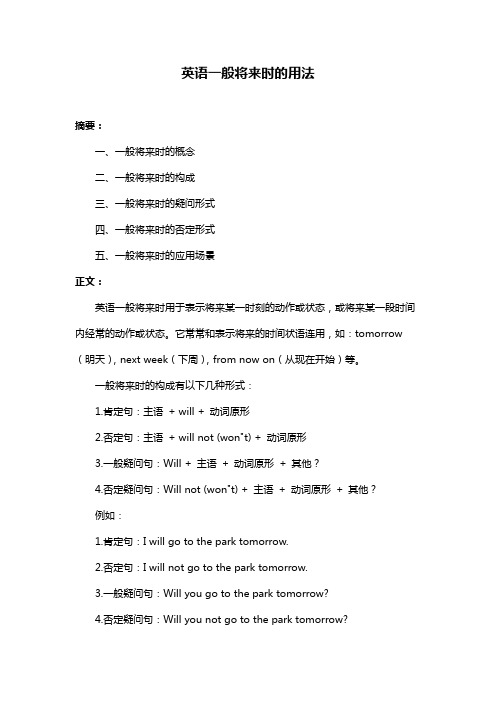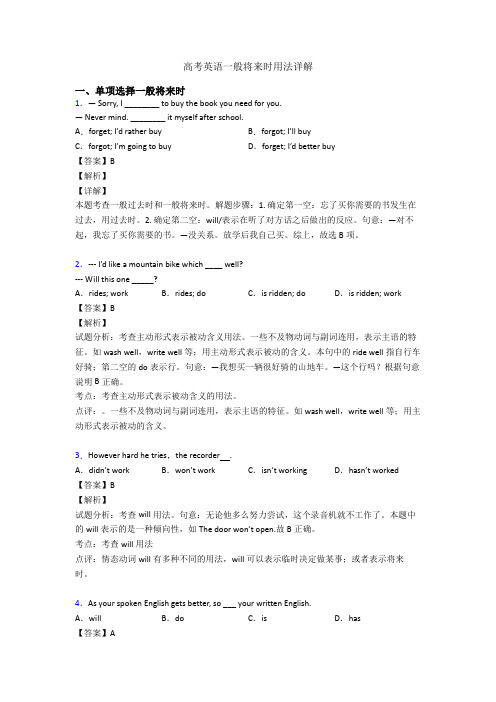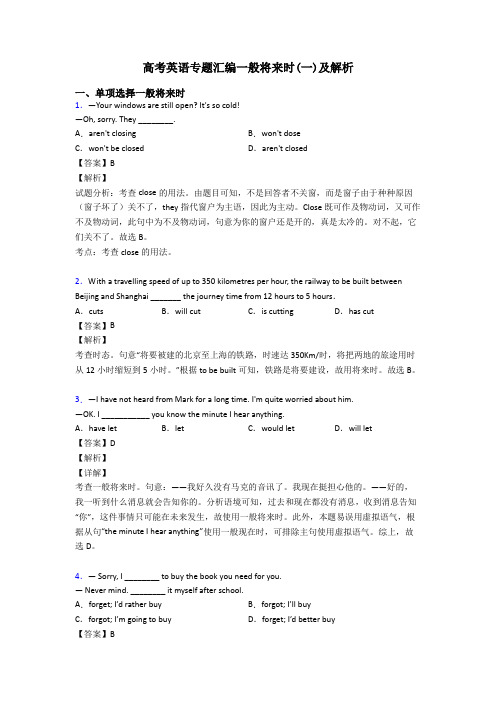高考英语一般将来时用法详解
高考英语语法专项:一般将来时

2019年高考英语语法专项:一般将来时一般将来时一般时包括一般现在时、一般过去时、一般将来时和一般过去将来时。
今天我们学习一般将来时。
一般将来时的构成一般将来时是由“will / shall + 动词原形”构成的。
shall只限于第一人称,主要见于英国英语,现在的趋势是第一、二、三人称的单复数形式均用will表示。
在口语中,shall和will常缩写成“‘ll”,紧接在主语之后。
其否定式shall not 和will not 常简略为shan’t 和won’t。
例句:I’ll go and shut the door.我去关门。
When will you know your exam results?你什么时候能知道考试结果?I can see you’re busy, so I won’t stay long.我看得出你很忙,所以我不会呆太久的。
提示:在you and I或both of us等短语后,只用will,不用shall。
You and I will arrive there next Monday.我和你下周一都要到达那里。
Both of us will graduate from middle school next year.我们俩明年中学毕业。
2. 一般将来时的用法①表示将要发生的动作或存在的状态I shall be free this afternoon.我今天下午有空。
There’ll be no chemistry classes tomorrow.明天没有化学课。
They will probably go to Shanghai for their holiday.他们可能去上海度假。
注意:在口语中,常用will / shall + be doing结构来代替will / shall + 动词原形,以表示生动。
I’ll be seeing a friend off at the airport.我要去机场给一个朋友送行。
英语一般将来时的用法

英语一般将来时的用法
摘要:
一、一般将来时的概念
二、一般将来时的构成
三、一般将来时的疑问形式
四、一般将来时的否定形式
五、一般将来时的应用场景
正文:
英语一般将来时用于表示将来某一时刻的动作或状态,或将来某一段时间内经常的动作或状态。
它常常和表示将来的时间状语连用,如:tomorrow (明天),next week(下周),from now on(从现在开始)等。
一般将来时的构成有以下几种形式:
1.肯定句:主语+ will + 动词原形
2.否定句:主语+ will not (won"t) + 动词原形
3.一般疑问句:Will + 主语+ 动词原形+ 其他?
4.否定疑问句:Will not (won"t) + 主语+ 动词原形+ 其他?
例如:
1.肯定句:I will go to the park tomorrow.
2.否定句:I will not go to the park tomorrow.
3.一般疑问句:Will you go to the park tomorrow?
4.否定疑问句:Will you not go to the park tomorrow?
一般将来时在实际应用中非常广泛,可以用于描述未来的计划、预期、愿望等。
高考英语一般将来时用法总结(完整)

高考英语一般将来时用法总结(完整)一、单项选择一般将来时1. -- How many people are expected to come to your party tomorrow afternoon?-- I send out thirty invitations but one third _____.A.didn’t show up B.won’t show upC.hadn’t showed up D.doesn’t show up【答案】B【解析】试题分析:考查时态。
根据语境及时间状语tomorrow afternoon可知用一般将来时。
句意:——期望有多少人来参加你明天的宴会?——我送出了30份邀请,但三分之一将不会出现。
故B正确。
考点:考查时态2.If their marketing plans succeed, they ________ their sales by 20 percent.A.will increase B.have been increasingC.have increased D.would be increasing【答案】A【解析】句意:要是他们的市场计划成功了,他们将增加20%的销售额。
从句是一般现在时表将来,主句常用一般将来时或情态动词can/may+动词原形。
3.AC Milan has confirmed that the England star David Beckham ______the team soon. A.has rejoined B.was going to rejoinC.rejoined D.is to rejoin【答案】D【解析】试题分析:考查时态。
本句考查的是将来时的一种表达法be to do sth将要做某事;句意:AC米兰俱乐部确认英国球星贝克汉姆将很快就重新加盟该队。
本句的关键词是soon该词经常与将来时连用。
高考英语一般将来时用法详解

高考英语一般将来时用法详解一、单项选择一般将来时1.— Sorry, I ________ to buy the book you need for you.— Never mind. ________ it myself after school.A.forget; I’d rather buy B.forgot; I’ll buyC.forgot; I’m going to buy D.forget; I’d better buy【答案】B【解析】【详解】本题考查一般过去时和一般将来时。
解题步骤:1. 确定第一空:忘了买你需要的书发生在过去,用过去时。
2. 确定第二空:will/表示在听了对方话之后做出的反应。
句意:—对不起,我忘了买你需要的书。
—没关系。
放学后我自己买。
综上,故选B项。
2.--- I’d like a mountain bike which ____ well?--- Will this one _____?A.rides; work B.rides; do C.is ridden; do D.is ridden; work【答案】B【解析】试题分析:考查主动形式表示被动含义用法。
一些不及物动词与副词连用,表示主语的特征。
如wash well,write well等;用主动形式表示被动的含义。
本句中的ride well指自行车好骑;第二空的do表示行。
句意:—我想买一辆很好骑的山地车。
—这个行吗?根据句意说明B正确。
考点:考查主动形式表示被动含义的用法。
点评:。
一些不及物动词与副词连用,表示主语的特征。
如wash well,write well等;用主动形式表示被动的含义。
3.However hard he tries,the recorder .A.didn’t work B.won’t work C.isn’t working D.hasn’t worked【答案】B【解析】试题分析:考查will用法。
高考英语十大时态

高考英语十大时态在高考英语中,时态是一个重要的语法知识点,掌握好时态对于理解和表达英语至关重要。
下面我们就来详细了解一下高考英语中的十大时态。
一、一般现在时一般现在时表示经常发生的动作、存在的状态或习惯性的动作。
它常与 always, usually, often, sometimes, never 等频度副词连用。
例如:I get up at six every morning(我每天早上六点起床。
)The earth moves around the sun(地球绕着太阳转。
)在一般现在时中,当主语是第三人称单数时,动词要发生相应的变化,一般是在动词词尾加 s 或 es。
二、一般过去时一般过去时表示过去某个时间发生的动作或存在的状态。
比如:I played basketball yesterday(我昨天打篮球了。
)He was a teacher ten years ago(十年前他是一名老师。
)与一般过去时连用的时间状语有:yesterday, last week, last month, last year 等。
三、一般将来时一般将来时表示将来要发生的动作或存在的状态。
我们可以用“will +动词原形”或者“be going to +动词原形”来表达。
例如:I will go to Beijing next week(我下周要去北京。
)She is going to have a party this weekend(她这个周末要举办一个聚会。
)四、现在进行时现在进行时表示现在正在进行的动作。
其构成是“be +动词的现在分词”。
Look! They are playing football(看!他们正在踢足球。
)现在进行时有时也可以表示即将发生的动作,通常与 come, go, leave 等动词连用。
五、过去进行时过去进行时表示过去某个时刻正在进行的动作。
It was raining heavily at eight o'clock yesterday morning(昨天早上八点雨下得很大。
高考英语专题汇编一般将来时(一)及解析

高考英语专题汇编一般将来时(一)及解析一、单项选择一般将来时1.—Your windows are still open? It's so cold!—Oh, sorry. They ________.A.aren't closing B.won't doseC.won't be closed D.aren't closed【答案】B【解析】试题分析:考查close的用法。
由题目可知,不是回答者不关窗,而是窗子由于种种原因(窗子坏了)关不了,they指代窗户为主语,因此为主动。
Close既可作及物动词,又可作不及物动词,此句中为不及物动词,句意为你的窗户还是开的,真是太冷的。
对不起,它们关不了。
故选B。
考点:考查close的用法。
2.With a travelling speed of up to 350 kilometres per hour, the railway to be built between Beijing and Shanghai _______ the journey time from 12 hours to 5 hours.A.cuts B.will cut C.is cutting D.has cut【答案】B【解析】考查时态。
句意“将要被建的北京至上海的铁路,时速达350Km/时,将把两地的旅途用时从12小时缩短到5小时。
”根据to be built可知,铁路是将要建设,故用将来时。
故选B。
3.—I have not heard from Mark for a long time. I'm quite worried about him.—OK. I ___________ you know the minute I hear anything.A.have let B.let C.would let D.will let【答案】D【解析】【详解】考查一般将来时。
一般将来时——高考英语重点时态语态满分攻略
一般将来时——高考英语重点时态语态满分攻略满分清单:一、构成1.is /am /are +现在分词2.will/shall +动词原形3.is/am/are going to +动词原形4.is/am/are about to +动词原形5.is/am/are to +动词原形二、用法1.will/shall +动词原形(1)表示现在看来以后要发生的动作或存在的状态You will find various choices available.你会发现有各种各样的选择。
(2)表示说话人临时做出的决定—Do you know Mr. Smith has come to our town?—No. I will go and visit him right now.——你知道史密斯先生来我们镇上了吗?——我不知道,我现在就去拜访他2.be going to +动词原形(1)表示打算、计划、决定要做的事或肯定要发生的事He is going to deliver a speech on first aid.他将就急救问题发表演讲。
(2)表示说话人根据已有的事实或迹象,推测某事即将发生Look at the dark clouds. It is going to rain看这些乌云,要下雨了。
3.be about to +动词原形表示打算或根据安排即将发生的动作。
它不与表示具体时间的状语连用,但可以与when 引导的时间状语从句连用。
Ladies and gentlemen, you are about to hear a most incredible tale.女士们,先生们,你们马上就要听到一个令人非常难以置信的故事。
4.be to +动词原形(1)表示按计划或安排要做的事情The opening ceremony is to take place next Sunday.开幕式将于下周日举行。
(2)表示按职责、义务将要发生的动作You are to report it to the police.你应该报警。
高考英语一般现在时表未来用法详解
高考英语一般现在时表未来用法详解高考英语一般现在时表未来用法详解1.当主句是将来时或表示将来时的意思时,时间条件状语从句必须用一般现在时表示将来时。
如:我有时间的时候会给她写信的。
我有时间的时候会给她写信的。
离开前关灯。
离开前关灯。
很抱歉,我们可能会赶上公共汽车。
如果我们快点,我们可能会赶上公共汽车。
告诉我以防你产生分歧。
遇到困难请告诉我。
【注意】表示让步、相似、比例的从句除了表示时间、条件的状语从句外,还必须用一般现在时表示将来。
如:他走的时候我会跟着他。
无论他去哪里,我都会跟着他。
不管你说什么,我都不付钱。
不管你说什么,我都不付钱。
不管我们帮不帮他,他都会失败。
不管我们帮不帮他,他都会失败。
无论输赢,我都会玩得很开心。
无论输赢,我都会打好。
你吃得越多,你就会变得越胖。
你吃得越多,你就会变得越胖。
另外,当主句是将来时时,定语从句通常用一般现在时表示将来。
如:你要什么我都给你。
你想要什么我都给你。
我找到的东西都可以给你。
我找到什么你就拿什么。
每个先到的人都会得到一份礼物。
每个先到的人都能得到一份礼物。
2.根据英国的习惯,如果一个句子中的主动词已经表示了所讨论的动作的时间,那么与它相关的其他动词就不必再次表示相同的时间,而是经常使用简单的时态,例如简单现在时来表示一般将来时。
对比一下。
如:这一发现意味着我们将在食物上花费更少。
这一发现意味着我们将在食物上花费更少。
发现将意味着我们在食物上花费更少。
这一发现意味着我们将在食物上花费更少。
3.在确定之后的那一句中,确定、小心、小心、留心、注意等。
一般现在时通常只用来表示将来的意思。
如:注意不要让它再次发生。
小心不要再发生了。
我们必须注意不要让任何人看到我们。
我们必须小心,不要让任何人看到我们。
确保你很快回来。
你必须保证很快回来。
小心不要伤害她的感情。
小心不要伤害她的感情。
注意不要让婴儿靠近加热器。
注意不要让婴儿靠近加热器。
在开始答题之前,请注意仔细阅读考题。
高考英语时态语态知识点
高考英语时态语态知识点一、时态知识点1. 一般现在时一般现在时表示经常性或习惯性的动作、状态或客观真理等。
例句:Water boils at 100 degrees Celsius.2. 一般过去时一般过去时表示过去某个时间发生的动作或存在的状态。
例句:She lived in London for five years.3. 一般将来时一般将来时表示将来某个时间即将发生的动作或存在的状态。
例句:I will finish my homework tomorrow.4. 现在进行时现在进行时表示现在正在进行的动作。
例句:They are watching a movie right now.5. 过去进行时过去进行时表示过去某个时间正在进行的动作。
例句:She was studying when I called her.6. 将来进行时将来进行时表示将来某个时间正在进行的动作。
例句:This time next week, we will be traveling in Japan.7. 现在完成时现在完成时表示过去某个时间发生的动作对现在造成的影响或结果。
例句:I have finished my homework.8. 过去完成时过去完成时表示过去某个时间或动作之前已经发生的动作或存在的状态。
例句:She had already left when I arrived.9. 将来完成时将来完成时表示将来某个时间之前已经完成的动作或存在的状态。
例句:By this time tomorrow, I will have finished my report.二、语态知识点1. 主动语态主动语态表示主语是动作的执行者。
例句:She wrote a letter.2. 被动语态被动语态表示主语是动作的承受者,强调动作对主语的影响。
例句:The letter was written by her.3. 进行时的被动语态进行时的被动语态表示主语正在被动地进行某个动作。
一般将来时的基本结构和用法
一般将来时的基本结构和用法
一般将来时用于表示将来发生的动作或事件。
以下是一般将来时的基本结构和用法:
一、基本结构:
1. 肯定句:
- 主语 + will + 动词原形
- I will travel to Japan next week.
我下周将去日本旅行。
- She will study for the exam tomorrow.
她明天将准备考试。
2. 否定句:
- 主语 + will not (won't) + 动词原形
- They won't attend the meeting.
他们不会参加会议。
- He won't forget your birthday.
他不会忘记你的生日。
3. 疑问句:
- Will + 主语 + 动词原形 + 其他?
- Will you come to the party?
你会来参加派对吗?
- Will they finish the project on time?
他们会按时完成项目吗?
二、用法:
- 表示将来发生的动作或事件。
- 表示预测、承诺、意图、计划等将来的行为或状态。
- 通常与表示将来时间的时间状语连用,如 tomorrow, next week, in the future 等。
值得注意的是,一般将来时通常用于与将来相关的动作和事件,而对于已经计划或安排好的未来事件,可以使用 "be going to" 结构。
- 1、下载文档前请自行甄别文档内容的完整性,平台不提供额外的编辑、内容补充、找答案等附加服务。
- 2、"仅部分预览"的文档,不可在线预览部分如存在完整性等问题,可反馈申请退款(可完整预览的文档不适用该条件!)。
- 3、如文档侵犯您的权益,请联系客服反馈,我们会尽快为您处理(人工客服工作时间:9:00-18:30)。
高考英语一般将来时用法详解一、单项选择一般将来时1.— Sorry, I ________ to buy the book you need for you.— Never mind. ________ it myself after school.A.forget; I’d rather buy B.forgot; I’ll buyC.forgot; I’m going to buy D.forget; I’d better buy【答案】B【解析】【详解】本题考查一般过去时和一般将来时。
解题步骤:1. 确定第一空:忘了买你需要的书发生在过去,用过去时。
2. 确定第二空:will/表示在听了对方话之后做出的反应。
句意:—对不起,我忘了买你需要的书。
—没关系。
放学后我自己买。
综上,故选B项。
2.If their marketing plans succeed, they ________ their sales by 20 percent.A.will increase B.have been increasingC.have increased D.would be increasing【答案】A【解析】句意:要是他们的市场计划成功了,他们将增加20%的销售额。
从句是一般现在时表将来,主句常用一般将来时或情态动词can/may+动词原形。
3.—Did you tell your parents about the result?—Oh, no, I forgot. I them now.A.will be calling B.will call C.am going to tell D.am to call【答案】B【解析】句意:A 选项是将来进行时,表示将来某个时间正在进行的动作;B、C、D均表示一般将来时。
will+v原形表示临时决定的;而be going to do和be to do是表示按计划或安排要做的事。
根据语境可知说话人是经别人提醒才临时想起要把结果告诉他父母,所以应该用will+v原形。
句意:--你告诉你父母结果了吗?--没有,我忘了。
我现在就去告诉他们。
试题分析:考查动词时态。
考点:考查动词时态。
4.We are always told that only through hard work our goals in our study.A.we will achieve B.we have achieved C.have we achieved D.will we achieve 【答案】D【解析】试题分析:考查倒装句:句意:有人告诉我们只有通过努力学习我们在学习上才能达到目标。
That引导的是宾语从句,宾语从句是用only+介词短语,构成的状语,句子用部分倒装,根据句意要用一般将来时,选D。
考点:考查倒装句5.What you learn today ______ of practical use when you hunt for a job.A.is proved B.proves C.will be proved D.will prove【答案】D【解析】试题分析:考察时态和系动词。
系动词prove证明,没有被动语态。
排除AC项。
句义:你今天所学得内容再你寻找工作的时候将会证明是很实用的。
根据句义是指在将来找工作的时候证明是有用的。
故D正确。
考点:考察时态和系动词用法6.--Jack! I have left my key to the office at home.-- Don’t worry. I _________ it for you. Wait a minute.A.get B.am going to get C.will get D.am getting【答案】C【解析】试题分析:考查时态:句意:--杰克!我把钥匙忘在办公室了。
--别担心,我去帮你拿,等一会。
根据句意是将要去拿。
BCD都可以表示一般将来时,B项be going to do是计划将要做,D项是马上就做,C项will do可以表示“临时决定”,选C。
考点:考查时态7.China's present environment situation is from bad to worse and if we _________ now to protect the environment, we’ll live to regret it.A.hadn’t acted B.haven’t acted C.don’t act D.won’t act【答案】C【解析】试题分析:句意:中国目前的环境状况越来越糟糕,如果我们现在不采取行动来保护环境,我们将会后悔。
if引导的条件状语从句,主句为一般将来时态,if从句用一般现在时态,选C。
考点:考查时态8. - Will you be available at three o'clock tomorrow afternoon?- No. I ______ a lecture then.A.are attending B.will have attended C.will attend D.will be attending 【答案】D【解析】试题分析:考查动词时态。
题意:“明天下午3点你有空吗?”“没空。
我要听一个报告。
”答句说的是未来某个时间点正在进行的动作,所以要用将来进行时态。
D项正确。
考点:时态。
9.(吉林长春高中毕业班第一次调研)—Alas! I have left my key to the office in my car.—Don't worry. I ________ it for you. Wait a minute.A.get B.am going to getC.will get D.am getting【答案】C【解析】C考查时态。
答语意为“别担心,我帮你去取。
等一下。
”此处will用于一般将来时,表示“将要做临时决定的事情”。
10.The project to developing the economy and reducing poverty when it is completed. A.has contributed B.had been contributedC.will contribute D.is contribute【答案】C【解析】试题分析:考查动词的时态。
句意:这项工程在竣工后,将会继续发展经济,减少贫穷。
根据句意可知表示将要发生的事情,用一般将来时,选C考点 : 考查动词的时11.The sky is clouding over;we can see there ________ a rainstorm.A.is going to be B.is going to haveC.will be D.will have【答案】A【解析】句意:天空乌云密布,看来要有暴风雨来临。
根据某种迹象表明将要发生某事,用be going to do sth,且有there be结构,故选A项。
12.By the time the doctor has made your lung checked, you_________ the result.A.gets B.has been gotC.will get D.is getting【答案】C【解析】试题分析:句意为“截止到医生检查完你的肺部,你才将会得到检查结果。
By the time引导的是时间状语从句,从句中用现在完成时代替将来完成式,故主句用一般将来时。
所以选C。
考点: 考查时态13.Close the door of fear behind you, and you ______ the door of faith open before you.A.will see B.have seenC.are seeing D.Saw【答案】A【解析】试题分析:句意:关掉你身后的恐惧之门,你就能看到你前面敞开的信念之门。
祈使句的句型:动词原形+ and you will表示并列,动词原形+ or you will表示转折。
A. will see 一般将来时 B. have seen现在完成时 C. are seeing 现在进行时D. saw一般过去时。
根据祈使句的句型特点,故选A。
考点:考查祈使句和动词时态的用法。
14.Turn on the television or open a magazine and you ________ advertisements showing happy families.A.will often see B.often seeC.are often seeing D.have often seen【答案】A【解析】考查“祈使句+and +陈述句”句型。
祈使句相当于一个条件状语从句,and后的陈述句的谓语用一般将来时,这是一个较为固定的句型。
15. -- How many people are expected to come to your party tomorrow afternoon?-- I send out thirty invitations but one third _____.A.didn’t show up B.won’t show upC.hadn’t showed up D.doesn’t show up【答案】B【解析】试题分析:考查时态。
根据语境及时间状语tomorrow afternoon可知用一般将来时。
句意:——期望有多少人来参加你明天的宴会?——我送出了30份邀请,但三分之一将不会出现。
故B正确。
考点:考查时态16.Mrs. Morris has left for London. She ________ a speech there next week.A.has given B.will give C.gives D.gave【答案】B【解析】考查时态。
句意:Morris女士已经去伦敦了。
她下周将在那儿做一次演讲。
由next week判断为一般将来时,故选B项。
17.Many students are about football. They play a game whenever possible.A.crazy; will B.crazy; are going toC.fond; will D.fond; are going to【答案】A【解析】第一空考查短语be crazy about “狂热”;第二空will表示“意愿”。
